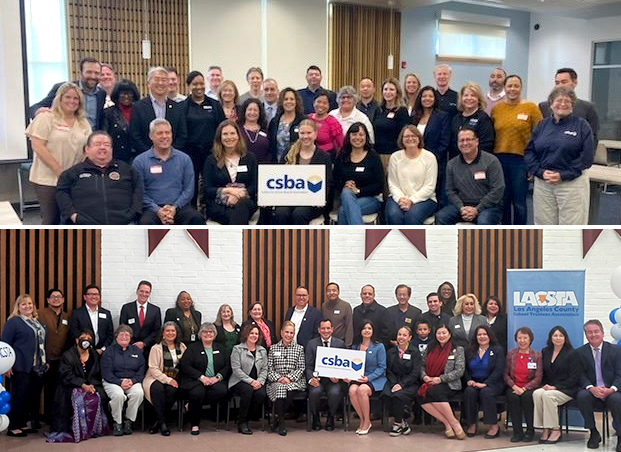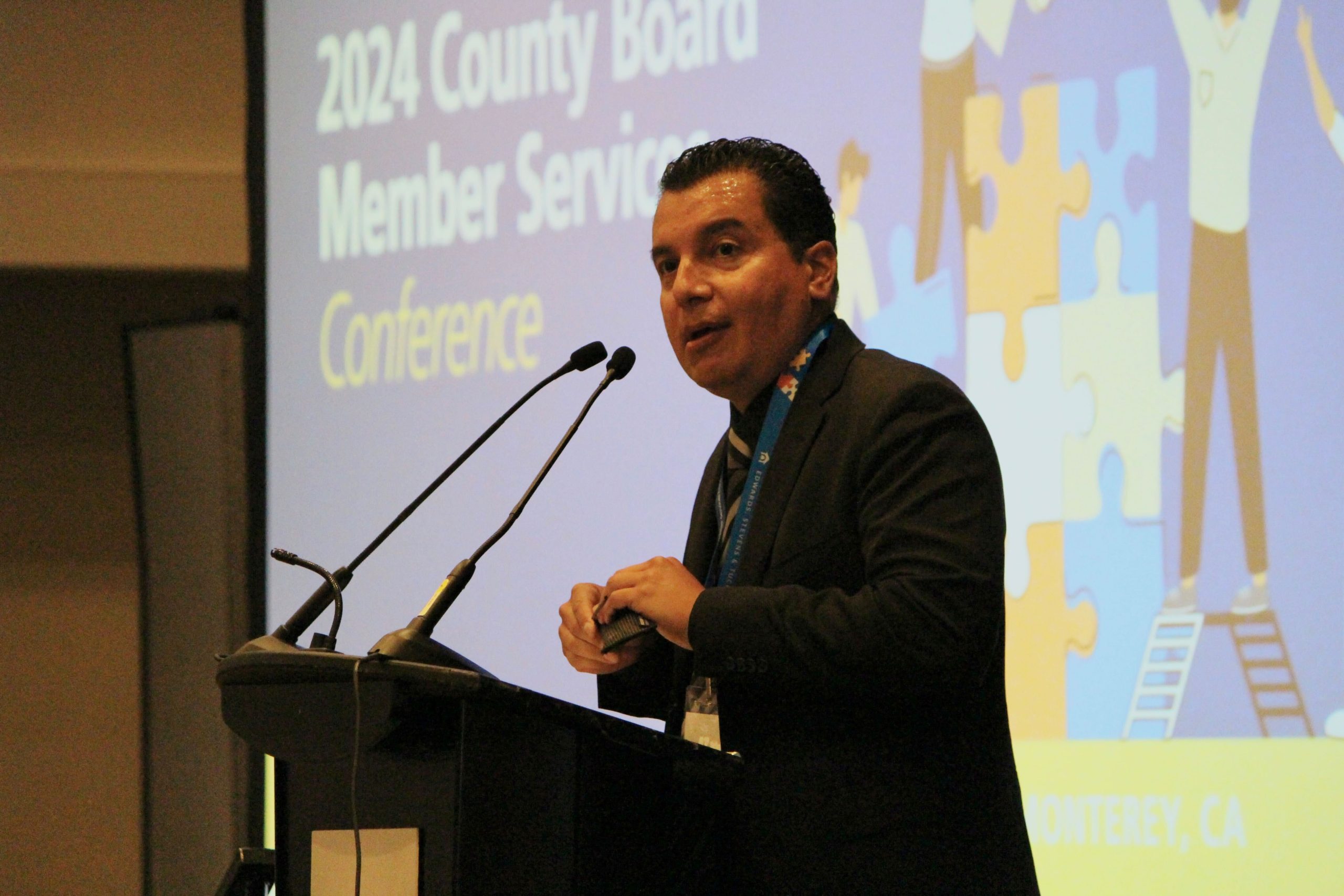By CSBA Public Affairs and Community Engagement Representative (PACER) Sarah Bradshaw
About 40 school board members, superintendents and administrative staff from across the Los Angeles area came together in El Segundo Unified School District on Feb. 24 to learn about the Governor’s proposed budget and critical legislation.
California School Boards Association Legislative Director Chris Reefe was joined by guest speakers Al Muratsuchi, chair of the California Assembly Education Committee, and Ben Allen, former chair of the Senate Education Committee — two of the limited number of former school board members currently serving as state legislators.
Muratsuchi served as a Torrance USD trustee and a CSBA Delegate and Allen hailed from the Santa Monica-Malibu USD and chaired both the Los Angeles County School Trustees Association (LACSTA) and the Los Angeles County Committee on School District Organization. Allen currently serves on the Senate Select Committee on School Climate and Safety and is a member on the Senate’s Select Committee on Student Success.
LACSTA hosted a separate event, which I’ll get into in more detail below.
As the legislators gave their introductory remarks, they helped bridge the gap between the State Capitol and local school districts. They noted their education-related legislative priorities and successes in the past year and highlighted their goals going forward.
CSBA’s Reefe then guided folks through an informative presentation on the state budget and provided a primer on how schools are funded in California and the various ways taxes are gathered. He addressed the issue of the pending deficit and the wisdom of having a “rainy day fund” specific for education needs. Reefe also explained that this tax year was particularly difficult to project due to a six-month delay in collections due to the multiple natural disasters that hit the state. He noted that the budget was literally being formed as the taxes were coming in.
In his presentation, Reefe also noted that the Governor is proposing a new funding maneuver to fully fund Proposition 98 in the prior fiscal year by borrowing against future-year state general fund revenues.
If adopted, the state would fund the $8 billion Prop 98 shortfall in the 2022–23 fiscal year using projected future state general fund revenues. According to the Legislative Analyst’s Office, this would retain all funding previously provided in the 2023 budget but recognize it over a five-year period beginning in 2025–26.
In another slide, Reefe highlighted changes to attendance reporting. To mitigate learning loss and chronic absenteeism, the budget includes proposed attendance recovery opportunities. These changes include:
- Allowing local educational agencies to add attendance recovery time to the information reported to the California Department of Education for both average daily attendance (ADA) and chronic absenteeism reporting.
- Permitting intercession opportunities beyond just Saturday School to provide ADA recovery in 15-minute increments, requiring programs to have a certificated staff person and meet a 1:20 classroom ratio.
- Limits ADA recovery to 15 days.
- Proposed allocation of $6 million in one-time Prop 98 General Fund to research and improve the delivery of hybrid and remote learning and disaggregated attendance reporting to reflect absences related to local and state emergencies.
Overall, the budget picture remains not great and somewhat murky. Meanwhile, school districts are required to issue any reduction-in-force notices by mid-March. Many though, and certainly not the student board member in attendance, recalled the drastic cuts required during the recession of 2007. The good news is that California’s schools are no longer 49th in the nation in per-pupil funding and are better prepared to deal with downturns.
Our thanks to all who attended this master class in budgeting and for the many questions. El Segundo USD Superintendent Melissa More emceed the event. Members from the Lawndale Elementary School District, Los Angeles USD, Irvine USD, Palos Verdes Peninsula USD, Centinela Valley High School District and Santa Monica-Malibu USD were represented at the event. From the speakers to the board members and superintendents, there was “a lot of talent in the room.” The resulting networking, commiserating and comradery were an added bonus.
The work continued
Speaking of LACSTA, the organization convened Feb. 26 at Bateman Hall in Lynwood for a social mixer. The rain did not dampen the spirits of the student performers or the attendees. CSBA Chief of Governmental Relations and former Assembly Education Chair, Patrick O’Donnell was the featured speaker. He was later joined by 62nd Assembly District member and Speaker Emeritus Anthony Rendon for a special presentation.
In his budget discussion, O’Donnell spoke of the gap between the Governor’s budget proposal and the Legislative Analyst’s Office’s projections. He noted that complicating matters was the six-month delay in tax collections due to weather-related disasters across the state. He also raised concerns about how Proposition 98 was being used.
O’Donnell encouraged attendees to become actively engaged with their local elected officials, particularly those in Sacramento. As he noted, “It is easy to say no to someone you’ve not met.” To that end, O’Donnell reminded attendees that CSBA’s Legislative Action Week (March 12-14) is fast approaching, and that people should register now. Meanwhile CSBA’s federal lobbying effort, Coast2Coast, is coming up in April.
After the budget conversation, Rendon was welcomed onstage to accept an award from LACSTA. They thanked him for his years of service and his commitment to the education community. O’Donnell then spoke warmly of his former colleague and lauded Rendon for having been a main driver in raising California’s per-pupil funding and for having made a significant contribution to the lives of children across the state.
In addition to O’Donnell, CSBA was represented by the four Los Angeles County PACERs Mary Linn Daehlin, Austin Moon, Jacob O’Donnell and me, Sarah Bradshaw.





